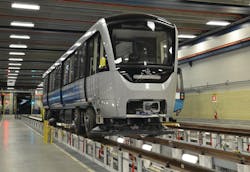QC: Azur makes Montreal Debut as STM Takes Delivery of First Prototype Train
The Société de transport de Montréal (STM) welcomed the arrival April 28 of the first Azur métro car, delivered by the Consortium Bombardier-Alstom (CBA) on a flatbed truck over 27 metres long.
“The arrival of the Azur prototype train is an awaited historical moment, a major milestone that paves the way for the delivery of a second, fully outfitted train that will begin serving our riders by late 2014 if testing goes according to plan,” said Philippe Schnobb, chairman of the STM Board of Directors.
“These new cars mark a critical milestone in the project to replace MR-63 metro cars and bring us a step closer to our objective of modernizing the metro network by increasing its reliability and capacity. They will help adequately respond to the significant increase in subway ridership and meet the expectations of Montrealers and all Québec citizens who will take the metro,” stated Robert Poëti, minister of transport and minister responsible for Montréal.
“With their contemporary styling and newly designed compartments, these cars will help revitalize our metro system by making it more powerful, comfortable and spacious, as well as brighter, quieter and better ventilated. These cars will, in a nutshell, make for a nicer ride,” added Montréal Mayor Denis Coderre.
Around 100 tests for a single prototype train
Once the train has been fully assembled, the CBA and STM teams will perform 100 or so static, dynamic and qualification tests up to an eight-month period. The testing will be carried out first at the Youville shops and then on a track linking the maintenance shop to the main network. The cars will then gradually commissioned throughout the network during the night time.
The tests will serve to assess the performance of various systems throughout the métro network to ensure that they meet technical specifications. The tests to be performed over the coming months include those related to verifying the train gauge in all possible operating conditions in the métro tunnels, as well as a wide range of tests on the propulsion, braking and ventilation systems, measurements of interior and exterior noise levels, riding comfort and train control. Other tests will verify new systems: passenger counting, video surveillance, public address, dynamic passenger information display and diagnostics. Dynamic testing will be performed with different train load scenarios, from empty to fully loaded. This will be achieved using bags of gravel to simulate the weight of over 1,500 passengers.
Refurbishment of the Youville shops for enhanced performance
As the new, 152-metre open-concept Azur train features gangways through its entire length, the STM had to modify the facilities at its Youville shops to accommodate them. The modifications to the site included the construction of six new elevated, pile-mounted maintenance tracks and one lifting track to facilitate access to components and make maintenance operations easier to carry out. Major procedural changes will also be applied to the removal, installation and transportation of bogies, the two-axle undercarriages that support métro cars. Thanks to a system that lifts all nine métro cars at once, technicians will have access to the train’s underframe and be able to replace the bogies without having to disconnect or move the métro cars. The bogies will therefore be able to be moved directly from the lifting track to the major repairs workshop.
The modification of the maintenance tracks required the shops’ connecting tracks to be reconfigured, increasing their numbers to seven. An additional connecting track was also built so that trains could move to a 240-metre-long building housing a train washer capable of washing both the trains’ underframe and exterior. Moreover, in the interests of sustainable development, 50 percent of the water used will come from the wastewater system and 25 percent will be recovered rainwater, with only 25 percent being sourced from the municipal water system. With their 72-train capacity, the new maintenance shops have been reconfigured to house specialized equipment, such as a new used-oil recovery system and a nitrogen distribution system for maintaining proper tire pressure.
Sustainable development is a fundamental part of the Azur acquisition process
The Azur cars are an inspiring example of ecodesign. The assembly techniques and materials that were chosen were subjected to a rigorous selection process in order to comply with the best sustainable development practices. Once the trains reach the end of their useful lifespan, 92.5 percent of each car will be reusable, recyclable or recoverable.
“The arrival of the new Azur métro cars is a crucially important event for the STM. These cars form a pivotal link in the enhancement of our service offering, which constitutes the top priority of our 2020 Strategic Plan. They will also improve métro reliability, which is essential to our users. Once the last customer service tests have been completed, we will begin taking delivery of one train per month. All 468 métro cars should be in service by fall 2018,” Schnobb said.
It is worth keeping in mind that the STM is a key driver of the economy. Over 150 Canadian suppliers, including some 100 longstanding Quebec businesses, are involved in this project, whose Canadian content exceeds 60 percent.
